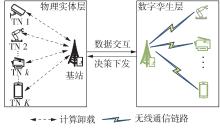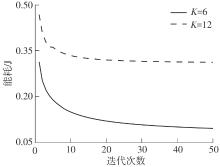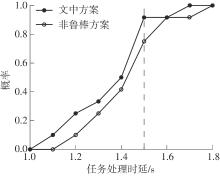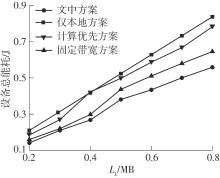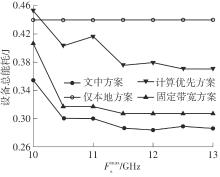| 1 |
GONG Y, YAO H, WANG J,et al .Edge intelligence-driven joint offloading and resource allocation for future 6G industrial internet of things[J].IEEE Transactions on Network Science and Engineering,2024,11(6):5644-5655.
|
| 2 |
姚锡凡,蓝宏宇,陶韬,等 .基于云雾结合的工件深度学习识别问题研究[J].华南理工大学学报(自然科学版),2019,47(12):1-8.
|
|
YAO Xifan, LAN Hongyu, TAO Tao,et al .Deep-learning recognition of workpieces based on cloud and fog computing[J].Journal of South China University of Technology(Natural Science Edition),2019,47(12):1-8.
|
| 3 |
ADREANI L, COLOMBO C, FANFANI M,et al .Rendering 3D city for smart city digital twin[C]∥ Proceedings of 2022 IEEE International Conference on Smart Computing.Helsinki:IEEE,2022:183-185.
|
| 4 |
CHIANG M, ZHANG T .Fog and IoT:an overview of research opportunities[J].IEEE Internet of Things Journal,2016,3(6):854-864.
|
| 5 |
BASTUG E, BENNIS M, DEBBAH M .Living on the edge:the role of proactive caching in 5G wireless networks[J].IEEE Communications Magazine,2014,52(8):82-89.
|
| 6 |
MAO Y, YOU C, ZHANG J .A survey on mobile edge computing:the communication perspective[J].IEEE Communications Surveys & Tutorials,2017,19(4):2322-2358.
|
| 7 |
ZHANG W, WEN Y, GUAN K,et al .Energy-optimal mobile cloud computing under stochastic wireless channel[J].IEEE Transactions on Wireless Communications,2013,12(9):4569-4581.
|
| 8 |
WANG Y, SHENG M, WANG X,et al .Mobile-edge computing: partial computation offloading using dynamic voltage scaling[J].IEEE Transactions on Communications, 2016,64(10):4268-4282.
|
| 9 |
ALE L, KING S A, ZHANG N,et al .D3PG:dirichlet DDPG for task partitioning and offloading with constrained hybrid action space in mobile-edge computing[J].IEEE Internet of Things Journal,2022,9(19):19260-19272.
|
| 10 |
张海波,李虎,陈善学,等 .超密集网络中基于移动边缘计算的任务卸载和资源优化[J].电子与信息学报,2019,41(5):1194-1201.
|
|
ZHANG Haibo, LI Hu, CHEN Shanxue,et al .Computing offloading and resource optimization in ultra-dense networks with mobile edge computation[J].Journal of Electronics & Information Technology,2019,41(5):1194-1201.
|
| 11 |
张先超,任天时,赵耀,等 .移动边缘计算时延与能耗联合优化方法[J].电子科技大学学报,2022,51(5):737-742.
|
|
ZHANG Xianchao, REN Tianshi, ZHAO Yao,et al .Joint optimization method of energy consumption and time delay for mobile edge computing[J].Journal of University of Electronic Science and Technology of China,2022,51(5):737-742.
|
| 12 |
WANG F, QIN R, LI J,et al .Parallel societies:a computing perspective of social digital twins and virtual-real interactions[J].IEEE Transactions on Computational Social Systems,2020,7(1):2-7.
|
| 13 |
JIANG L, ZHENG H, TIAN H,et al .Cooperative federated learning and model update verification in blockchain-empowered digital twin edge networks[J].IEEE Internet of Things Journal,2022,9(13):11154-11167.
|
| 14 |
SUN W, ZHANG H, WANG R,et al .Reducing offloading latency for digital twin edge networks in 6G[J].IEEE Transactions on Vehicular Technology,2020,69(10):12240-12251.
|
| 15 |
LIU T, TANG L, WANG W,et al .Digital-twin-assisted task offloading based on edge collaboration in the digital twin edge network[J].IEEE Internet of Things Journal,2022,9(2):1427-1444.
|
| 16 |
CUI H, ZHANG R, SONG L,et al .Capacity analysis of bidirectional AF relay selection with imperfect channel state information[J].IEEE Wireless Communications Letters,2013,2(3):255-258.
|
| 17 |
LIU W, WANG H, ZHANG X,et al .Joint trajectory design and resource allocation in UAV-enabled heterogeneous MEC systems[J].IEEE Internet of Things Journal,2024,11(19):30817-30832.
|
| 18 |
SHEN Y, WANG C, ZANG W,et al .Outage constrained max-min secrecy rate optimization for IRS-aided SWIPT systems with artificial noise[J].IEEE Internet of Things Journal,2024,11(6):9814-9828.
|
| 19 |
WANG J, FENG D, ZHANG S,et al .Joint computation offloading and resource allocation for MEC-enabled IoT systems with imperfect CSI[J].IEEE Internet of Things Journal,2021,8(5):3462-3475.
|
| 20 |
DAI Y, ZHANG K, MAHARJAN S,et al .Deep reinforcement learning for stochastic computation offloading in digital twin networks[J].IEEE Transactions on Industrial Informatics,2021,17(7):4968-4977.
|
| 21 |
VAN HUYNH D, KHOSRAVIRAD S R, MASARACCHIA A,et al .Edge intelligence-based ultra-reliable and low-latency communications for digital twin-enabled metaverse[J].IEEE Wireless Communications Letters,2022,11(8):1733-1737.
|
| 22 |
DINH T Q, TANG J, LA Q D,et al .Offloading in mobile edge computing:task allocation and computational frequency scaling[J].IEEE Transactions on Communications,2017,65(8):3571-3584.
|
| 23 |
LIU A, LAU V K N, KANANIAN B .Stochastic successive convex approximation for non-convex constrained stochastic optimization[J].IEEE Transactions on Signal Processing,2019,67(16):4189-4203.
|
| 24 |
YANG Y, SCUTARI G, PALOMAR D P,et al .A parallel decomposition method for nonconvex stochastic multi-agent optimization problems[J].IEEE Transactions on Signal Processing,2016,64(11):2949-2964.
|
| 25 |
DU J, ZHAO L, FENG J,et al .Computation offloading and resource allocation in mixed fog/cloud computing systems with min-max fairness guarantee[J].IEEE Transactions on Communications,2018,66(4):1594-1608.
|
| 26 |
ZHANG H, LIU X, XU Y,et al .Partial offloading and resource allocation for MEC-assisted vehicular networks[J].IEEE Transactions on Vehicular Technology,2024,73(1):1276-1288.
|
 ), LI Yiming1, LI Shun1
), LI Yiming1, LI Shun1
